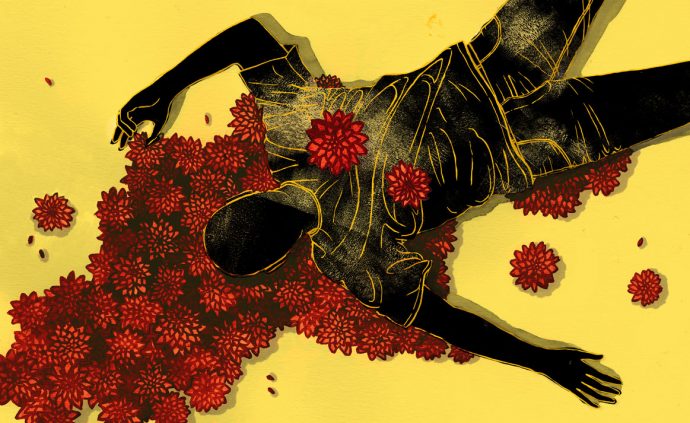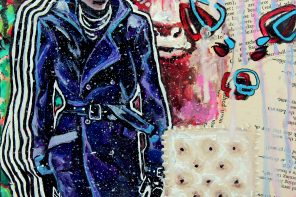Tamir Rice
–Emily DickinsonYellow mansion: Lemon Hill.
Lemon Hill. Sun glinting in windows. Same sun
glittering broken glass on court. Balls fly
backwards. From long distances. Through legs.
Balls clang. Clang. Clang. Off iron rim.
Ball caroms to my boy.
Shoot. He runs
(no dribbling) and releases: five feet up.
Nowhere near rim. Iron rim. But circle of high-fives.
For the try.
Game begins. Three-on-three.
By ones. Two points beyond the arc. Concussion
of ball. Talk. Clang. Talk. Concussion of ball.
Talk. Clang. Curse. Curse. Ball. Clang. Off
iron rim.
Off iron rim & off the court. Across
graffiti sidewalk: 30th Street. Stay out our park.
Across & into long clover. Lemon Hill. Ball
heaved. Across sun. Onto court. Concussion.
Concussion of ball. Clang. Three-on-two.
Wait up.
Clang. Off the iron rim & off the court. Again.
Across & into long clover. Again. Nope—I ain’t going.
Boy lies down. Hands under head. Eyes shut.
To sun. To Lemon Hill. Pleas. Taunts. Taunts.
Pleas. Pebbles at his face. Pebbles. Pebbles.
Pebbles. Eyes shut. My boy next to him, mimic.
Lies down. Hands under head. Eyes shut.
A friend
caves. Sprints down slope. Across & into long clover.
Lemon Hill. Ball heaved. Across sun. Concussion
of ball. First boy up. My boy down. Game revives,
my boy still down. On court. Won’t stand up.
Won’t open eyes. But laughter. Laughter. Up & over
my shoulder. Laughter. Small weight. Closed eyes.
Laughter. Laughter. Tight-eyed laughter. Toward
30th Street & home.
Behind us: concussion & clang.
Talk & shout. Curse & curse. Concussion, concussion
& clang. Clang & curse. Concussion. Behind us
& iron rim & six boys & splinters of liquor glass:
mansion windows. Mansion windows. Sun
glinting. Sun. Sun. Glinting. Glinting. Sun. Lemon
Hill. Mansion. Glinting. Sun. Heavy going-down
sun. Heavy, heavy (glinting) going-down sun.
whatever wilderness contained there
Our first train broke down in the station, and this train teems with two loads of passengers. Most seats were taken when Naomi and I got on—she’s sitting four rows in front of me and across the aisle. We have passed the zoo and are cutting through North Philadelphia. I am reading the newspaper, and Naomi unpacks a lunch. A woman, her white curls rolled tight, has limped through our car twice and cannot find a seat. She complains to the conductor. She is loud, and we are in the Quiet Car. The conductor asks for her ticket and inspects it. Her ticket is for this train. Not our broken-down train. If you have a ticket for the Keystone, he says, stand up and make room for Vermonter passengers. He says we were told this before we boarded. We were not. The conductor is standing over Naomi and sees her ticket for the other train. He tells her to stand.
I stand and say, I’ll give her my seat. I do not act out of kindness for the woman. That doesn’t matter, he says. All Keystone passengers must give up their seats. He is standing over Naomi. She is packing her lunch and slow to rise. He insists she leave the seat. We are in the Quiet Car. The conductor tugs at her elbow, and she drops her sandwich. I step toward him and explain that she is pregnant. That doesn’t matter, he says. She has the wrong ticket. You were told before you boarded. I say, No, we weren’t. Other passengers from the broken-down train mumble in agreement. My voice is rising when I say again, She is pregnant. I do not tell him: early on. First week of the second trimester. Probably, she could make the trip to New York on her feet. She is pregnant, I say. Am I acting to protect her? She is carrying a child. She is not standing, I say. We are in the Quiet Car. Everyone is staring at me. My jaw clenches.
The conductor is a small man. I am not a small man. Naomi is not standing. She is pregnant. I am standing. Close to the conductor. Over the conductor. My jaw clenches. I’ll throw you off at Trenton, he says. Fine with me, I say, but she is pregnant. She is not standing. He says, I’m throwing you off at Trenton. Great, I say, but if I’m getting thrown off, you’re getting thrown off, and everybody else is getting thrown off. Except her, I say, because she’s pregnant, and she’s not standing. Am I acting to protect her? This is not rational. I don’t know how I’d make this throwing off happen. We are in the Quiet Car. My jaw clenches. Naomi is looking up at me. I have seen this look before when I have yelled—like a skittish dog and as if she doesn’t know me. Am I acting to protect her? She is pregnant. She is carrying a child.
The conductor is a small man. He is no longer threatening me with Trenton. He is making a semantic argument: You can say she’s pregnant, he says, but you can’t say that she’s not standing. I laugh. I am winning. No, I say, I’m saying she’s pregnant and she’s not standing. We are in the Quiet Car. People are staring at me. I’m staring at the conductor. The breath moves fast through the knot in his throat. My jaw clenches. He is a small man. I am winning. He shakes his head. He turns and sidles down the aisle. I have won. When he comes back, he will not look at me. I have won. Naomi is sitting. We are in the Quiet Car. She is pregnant. Early on. Was I acting to protect her? She is carrying a child. I have won.
GameStop
for Robert Wilson III
The boy needs a present (he was
born). And blocks from your boyhood,
you pull in, stop your day to stand
in line, a shirt among other shirts.
It’s over quickly: they bluster in
and shout. Smooth motion:
you wheel, thumb flicks, holster
unfastens, palm fits to grip. You
shout. They fire. You fire. They
fire and hit. They fire and hit. You
fall. You fire. You fire. You fire
and hit. No fall. They fire. Gone:
whatever mutual hunger and dream
divided you from them, pushed you
from that block to this corner
of the room. Gone: whatever son,
whatever imperfect love led you
to this line. They bluster and shout.
They fire. You fire. They fire and hit.
They run. They run. You breathe. You
breathe. Quickly. Hunger. Dream.
Gone. Line. Stand. Line. Gone.
You breathe. Quickly. Hunger.
Gone. Son. Quickly. Stop. Gone.
Crow’s Head with Red Dahlias
Outside the white house—low roof
and green shutters—and peeling
gray barn where we will never live,
a crow dug in the mud with its beak
and swallowed roots and tubers, whole.
When I passed by again, black feathers
were wind-scattered into the fence. Scarlet
dahlias grew through sockets of crow skull.
We will never live there, or perhaps
only for one night paling into morning,
but for that fleeting (Red, Red, Red,
Red), I was alive and happy.
Iain Haley Pollock is the author of Spit Back a Boy, winner of the 2010 Cave Canem Poetry Prize. He teaches English at Rye Country Day School in Rye, New York, and is on the poetry faculty at Pine Manor College’s Solstice MFA Program.




